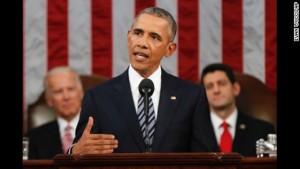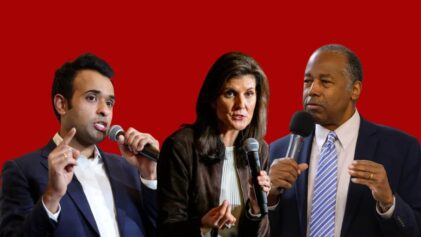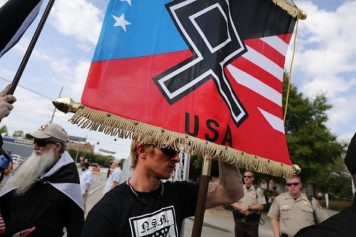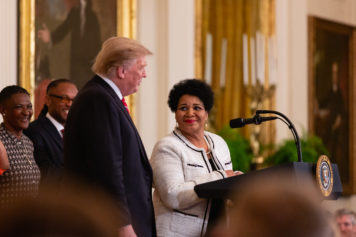On Tuesday night, President Obama delivered his final State of the Union address before a joint session of Congress. And by all accounts, it was a well-delivered, well executed speech that rallied the Democratic Party against their Republican rivals in a pivotal election year. And yet, there was no mention of the Black community — the president’s most loyal constituency and the heart of his base. He did not directly address some of the subject matter that Black voters would have expected, the things they wanted to hear, while touching on other matters in a more subtle form.
Full remarks: Watch @POTUS deliver his final State of the Union address. #SOTU https://t.co/AOyWjdFk4O
— The White House (@WhiteHouse) January 13, 2016
In his State of the Union preview on Twitter and Facebook, there was an indication, perhaps misread, that the more “Black” Obama was coming out—the one who cared little about the haters. The organ playing in the background hinted that the president was about to go to church—Black church, that is:
Straight from the Oval Office: Watch @POTUS reflect on his final State of the Union. https://t.co/7ZgBUWqyl1 #SOTU https://t.co/9w63dYEVhU
— The White House (@WhiteHouse) January 12, 2016
America, particularly the Black community, saw President Obama go to church when he delivered the eulogy for South Carolina State Senator Clementa Pinckney, pastor of the historic Emanuel AME Church. Pinckney was one of nine Black church members gunned down by Dylann Roof, a white supremacist, during a Bible study. There is a place for symbolism, and through his rendition of “Amazing Grace,” he was signaling in his second term in office a common cause with Black folks that was hard to come by in the earlier days of his presidency.
From the beginning, Barack Obama faced what is known as the “Jackie Robinson syndrome.” It is the phenomenon that Black firsts experience when entering a white space, or a space that was really intended only for whites to occupy, such as the White House. There were the double standards and the insistence that he not become the angry Black man. Don’t associate yourself too closely with Black folks, for fear of being accused of favoritism and being labeled “too Black.” There were expectations of the man by white detractors, the attempts to derail and compromise everything he attempted to do, and the refusal by white nationalists to participate or cooperate in anything he accomplished — no policies, no Obamacare, no stimulus, nothing that would make the Black man look good and help his legacy, even if it meant improving the lives of their own constituencies.
In the 2008 election, we previewed the Jackie Robinson syndrome at work, when then-Senator Obama gave a speech about race. He was allowed to speak some truths about the issue but was closely monitored to ensure he sufficiently threw his pastor and mentor, Rev. Jeremiah Wright, under the bus. In his first term, when voices of leadership from the Black community urged and pleaded with President Obama to address the high Black unemployment, poverty and other matters of concern to them, he was criticized for placing too much faith in a circle of white neoliberal Wall Street advisers who did not have the interests of Black America in mind. Meanwhile, the opportunities to address race — including the “beer summit” arising from the arrest of Harvard Professor Henry Louis Gates for breaking into his own home — resulted in a superficial treatment of institutional racism and police abuse. And even when he attempted to hold a larger conversation on the mistreatment Black people face, he backed down and backtracked.
Meanwhile, in the second term of the Obama administration, there were considerable changes in tone and tenor when it came to matters of grave concern to Black people. At the same time, there was a confluence of events, as calls for criminal justice reform, an end to the war on drugs and the dismantling of America’s system of mass incarceration took center stage. Moreover, the #BlackLivesMatter movement emerged, an outgrowth of audacious Black outrage and determination to change a system built on violence against Black bodies.
Last year, the president expressed a hope that his successor would pick up where he left off on issues of racial justice. President Obama made calls for reform of the criminal justice system, sentencing and support for re-entry, with executive orders to that effect. Further, he spoke up and spoke out on the gun violence facing America, particularly facing the Black community in cities such as his native Chicago. And he offered a stable of executive actions that, while by no means a panacea for the systemic issues and challenges of institutional racism and white supremacy, was at least a means of getting the ball rolling.
On his way out the door, did President Obama appear to leave Black people behind? What will his legacy be with Black America? Black Lives Matter has emerged as the preeminent civil rights movement of our time. The president has the largest bully pulpit in the nation, if not the world, and his final State of the Union address was arguably the largest stage he will ever have. Certainly, his administration will prove to be the most important stage Black people will ever have again in years, because it is doubtful there will be another Black president for quite some time. And the president did not mention the emerging movement to make America honest and make it come to terms with an unresolved legacy of racism in America. Further, the chief executive failed to mention the strides his own administration has made in the areas of racial justice. Was it a missed opportunity?



